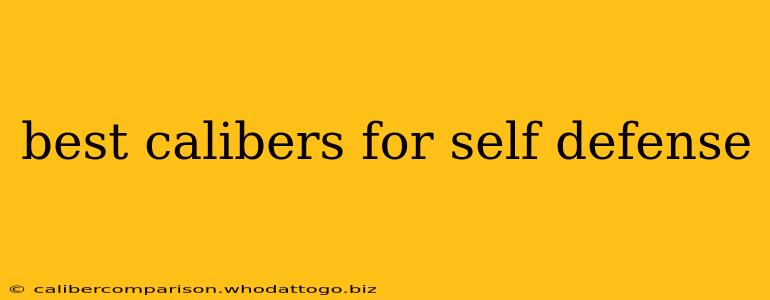Choosing the right caliber for self-defense is a crucial decision, impacting your safety and effectiveness in a critical situation. This isn't a decision to be taken lightly; it requires careful consideration of various factors, including personal capabilities, legal restrictions, and the specific threats you might face. This guide will explore some of the most popular and effective calibers, helping you make an informed choice. Remember, this information is for educational purposes only; consult with firearms experts and legal professionals before making any decisions regarding firearm ownership or usage.
Factors to Consider Before Choosing a Caliber
Before diving into specific calibers, let's examine the key factors influencing your selection:
1. Shootability:
- Recoil: Heavier calibers generate more recoil. Managing recoil is vital for accuracy, especially under stress. If you're a smaller-framed individual or new to firearms, a lower-recoiling caliber might be a better choice.
- Accuracy: Accuracy is paramount in self-defense. A caliber you can shoot accurately and consistently under pressure is far more effective than a powerful round you can't control. Practice is key, regardless of caliber.
- Controllability: This encompasses both recoil management and the ability to quickly and accurately place follow-up shots.
2. Stopping Power:
- Energy Transfer: Higher-energy rounds generally deliver more stopping power, meaning they're more likely to incapacitate an attacker quickly. However, shot placement is far more important than sheer energy.
- Penetration: A round must penetrate sufficiently to reach vital organs. Over-penetration can pose a risk to bystanders, so finding a balance is crucial.
- Expansion: Expanding bullets (hollow points) increase the wound cavity, potentially enhancing stopping power. However, expansion is not guaranteed, and regulations vary regarding their legality.
3. Availability and Cost:
- Ammunition Availability: Ensure the caliber you choose has readily available ammunition, especially in your region. Popular calibers generally have better availability and often more competitive pricing.
- Cost of Ammunition: Ammunition costs can significantly impact your training budget and overall preparedness.
Popular Self-Defense Calibers: A Detailed Look
Now let's delve into some of the most frequently discussed calibers for self-defense:
9mm Luger:
- Pros: Excellent balance of shootability, stopping power, availability, and affordability. Widely available in various firearm platforms, making it a versatile choice.
- Cons: May require more precise shot placement compared to larger calibers for optimal effectiveness.
.45 ACP:
- Pros: High stopping power due to its large bullet diameter and substantial energy transfer. Relatively simple to reload.
- Cons: Significant recoil, limiting its suitability for smaller individuals or those new to firearms. Ammunition can be more expensive than 9mm.
.40 S&W:
- Pros: Balances stopping power and shootability better than the .45 ACP, offering a good compromise for many users.
- Cons: More recoil than 9mm, although less than .45 ACP. Some argue its advantages aren't significant enough to justify its increased recoil compared to the 9mm.
.380 ACP:
- Pros: Low recoil, making it suitable for smaller individuals or those new to firearms. Easy to conceal. Relatively inexpensive.
- Cons: Lower stopping power compared to larger calibers; requires precise shot placement for optimal effectiveness.
.22 LR:
- Pros: Extremely low recoil, inexpensive ammunition, and quiet operation with appropriate firearms. High capacity magazines are available.
- Cons: Limited stopping power, emphasizing the critical need for accurate shot placement and multiple hits. Penetration may be insufficient in some situations.
Conclusion: The Best Caliber for You
There's no single "best" caliber for self-defense; the optimal choice depends heavily on individual factors. Consider your physical capabilities, experience level, legal restrictions, and the specific threats you may face. Prioritize a caliber you can shoot accurately and consistently under pressure. Invest in professional training to hone your skills, regardless of your chosen caliber. Remember, responsible gun ownership involves proper training, safe handling, and adherence to all applicable laws.

